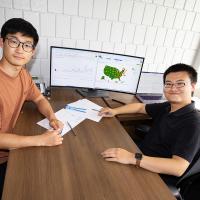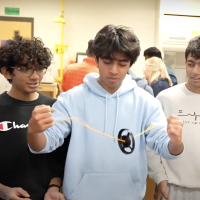5 min read
Three of Georgia Tech’s own join the honorary and research organization founded in 1780.
4 min read
5 min read
Brand, the executive director of the Georgia Tech Institute for Electronics and Nanotechnology, passed away on April 13, 2023. He was a valued researcher, leader, colleague, and friend.
1 min read
3 min read
Physicist Steven Chu was the first person appointed to the U.S. Cabinet after having won a Nobel Prize. On April 26, he will deliver a public lecture at Georgia Tech on climate change and innovative paths towards a more sustainable future.
2 min read
6 min read
5 min read
With funding from the National Geographic Society, researchers at the Georgia Institute of Technology and the University of California, Los Angeles (UCLA) will travel to St. Croix to analyze coral.
4 min read















